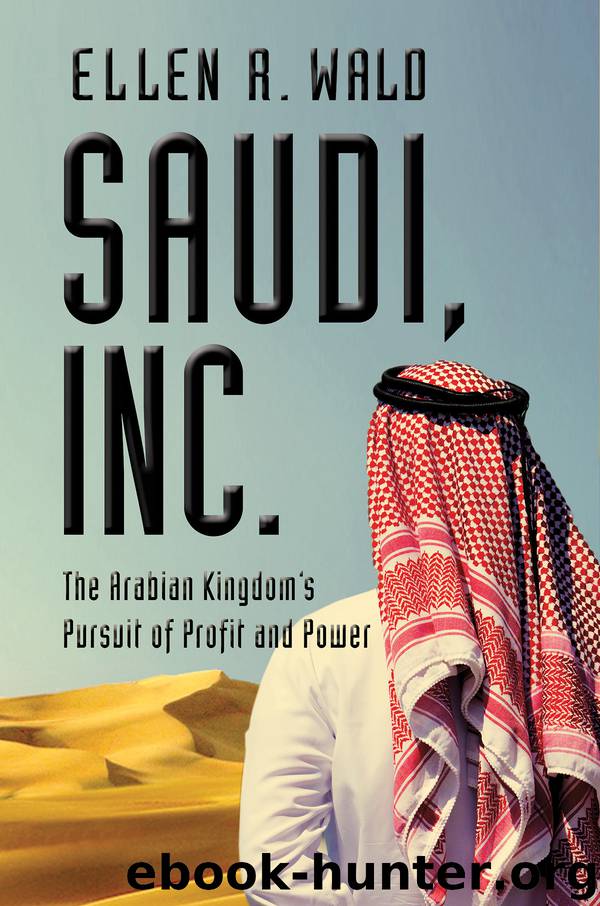Saudi, Inc.: The Arabian Kingdom's Pursuit of Profit and Power by Ellen R. Wald

Author:Ellen R. Wald [Wald, Ellen R.]
Language: eng
Format: epub
Tags: Arabian Peninsula, Banks & Banking, Business & Economics, Finance, History, Islam, Middle East, Religion
ISBN: 9781681777184
Google: YKAvDwAAQBAJ
Amazon: B074D4YPDQ
Publisher: Pegasus Books
Published: 2018-04-03T03:00:00+00:00
Alongside the turn to religious orthodoxy, Saudi society did continue its path toward modernization in other areas. The massive growth in education speaks to this. In 1960, Saudi Arabia did not have compulsory education, and only 12 percent of Saudi youth were enrolled in primary school.41 By 1986, that number had grown to 52 percent.42 In 2007, with school attendance compulsory, almost 95% of primary age children were enrolled in school. Even though Saudi law only required students to attend up to age fourteen, the number of children attending secondary school grew as well. In 1970, only about 15,000 Saudis were enrolled in secondary education. By 1980 that number had increased to 100,000 pupils, and as of 2007, 90 percent of secondary age children were enrolled in school.43
In 1974, only 4.1 percent of 20- to 24-year-olds in Saudi Arabia (men and women) were enrolled in institutions of higher education. By 1986, that number increased to almost 14 percent.44 Almost two decades later, however, that number had barely doubled.45 For twenty-five years following the seizure of the Grand Mosque, foreign study (which once had been encouraged by the kingdom and enjoyed by princes as well as promising citizens) was barely supported. Finally, in 2005, King Abdullah established a scholarship under his name to promote higher education. This program awarded full scholarships, along with travel and living expenses, to any Saudi student pursing higher education outside the country. The program proved extremely popular, and by 2014, almost 200,000 Saudi students were attending American universities at the undergraduate and graduate level.46 Increased funding for higher education within the kingdom also helped send more students to colleges and universities in Saudi Arabia—for both Islamic and secular educations. In 2015, Saudi Arabia reported that 63 percent of 20- to 24-year-old youth were enrolled in higher education.47
The implications from this explosion in education—particularly higher education and higher education obtained abroad—were significant. The primary benefit for al Saud was a growing resource of technocrats, professionals, engineers, and even entrepreneurs. On the other hand, the rapid expansion in higher education led to a growing number of professionals seeking high-paying jobs in the kingdom, which the job market could not fully accommodate. As a result of Aramco, the modern Saudi economy had always been dominated by the oil and gas sector. The Saudi government also invested heavily in related industries such as petrochemicals and mining. Other areas, such as communications, tourism, healthcare, retail, and non-petroleum-related manufacturing have lagged behind the energy sector.48 By the 1990s and 2000s, the government had become the largest employer, employing 70 percent of Saudis in the workforce.49 This unequal growth created an imbalance in the Saudi economy that, along with a lack of private sector jobs, frustrated young, educated job seekers.
International students returned to Saudi Arabia exposed to other cultures and societies significantly less conservative than Saudi Arabia. Dr. Janet Breslin-Smith, the wife of former Ambassador James B. Smith, said that Saudi Arabia is “socially conservative, culturally conservative in ways that [are] hard for us to even get our arms around.
Download
This site does not store any files on its server. We only index and link to content provided by other sites. Please contact the content providers to delete copyright contents if any and email us, we'll remove relevant links or contents immediately.
The Meaning of the Library by unknow(2568)
Six Billion Shoppers by Porter Erisman(2296)
Why Nations Fail: The Origins of Power, Prosperity, and Poverty by Daron Acemoglu & James Robinson(2290)
No Time to Say Goodbye(2115)
Red Notice by Bill Browder(2071)
The Economist [T6, 22 Thg9 2017] by The Economist(1926)
Currency Trading For Dummies by Brian Dolan(1925)
Thank You for Being Late by Thomas L. Friedman(1767)
Bitcoin: The Ultimate Guide to the World of Bitcoin, Bitcoin Mining, Bitcoin Investing, Blockchain Technology, Cryptocurrency (2nd Edition) by Ikuya Takashima(1698)
Amazon FBA: Amazon FBA Blackbook: Everything You Need To Know to Start Your Amazon Business Empire (Amazon Empire, FBA Mastery) by John Fisher(1573)
Coffee: From Bean to Barista by Robert W. Thurston(1543)
The Future Is Asian by Parag Khanna(1481)
The Great Economists by Linda Yueh(1454)
How Money Got Free: Bitcoin and the Fight for the Future of Finance by Brian Patrick Eha(1425)
Grave New World by Stephen D. King(1418)
Pocket World in Figures 2018 by The Economist(1416)
Capitalism Without Capital: The Rise of the Intangible Economy by Jonathan Haskel(1398)
The Sex Business by Economist(1382)
Cultural Intelligence by David C. Thomas(1287)
